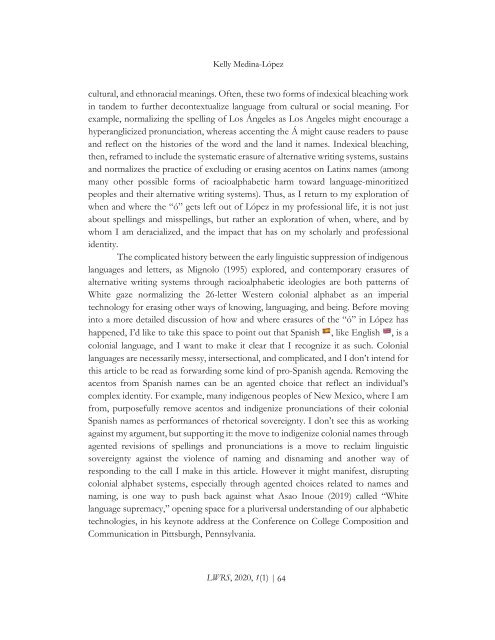LWRS June 2020 Volume 1, Issue 1
Inaugural Issue co-edited by Yndalecio Isaac Hinojosa and Isabel Baca
Inaugural Issue co-edited by Yndalecio Isaac Hinojosa and Isabel Baca
Create successful ePaper yourself
Turn your PDF publications into a flip-book with our unique Google optimized e-Paper software.
Kelly Medina-López<br />
cultural, and ethnoracial meanings. Often, these two forms of indexical bleaching work<br />
in tandem to further decontextualize language from cultural or social meaning. For<br />
example, normalizing the spelling of Los Ángeles as Los Angeles might encourage a<br />
hyperanglicized pronunciation, whereas accenting the Á might cause readers to pause<br />
and reflect on the histories of the word and the land it names. Indexical bleaching,<br />
then, reframed to include the systematic erasure of alternative writing systems, sustains<br />
and normalizes the practice of excluding or erasing acentos on Latinx names (among<br />
many other possible forms of racioalphabetic harm toward language-minoritized<br />
peoples and their alternative writing systems). Thus, as I return to my exploration of<br />
when and where the “ó” gets left out of López in my professional life, it is not just<br />
about spellings and misspellings, but rather an exploration of when, where, and by<br />
whom I am deracialized, and the impact that has on my scholarly and professional<br />
identity.<br />
The complicated history between the early linguistic suppression of indigenous<br />
languages and letters, as Mignolo (1995) explored, and contemporary erasures of<br />
alternative writing systems through racioalphabetic ideologies are both patterns of<br />
White gaze normalizing the 26-letter Western colonial alphabet as an imperial<br />
technology for erasing other ways of knowing, languaging, and being. Before moving<br />
into a more detailed discussion of how and where erasures of the “ó” in López has<br />
happened, I’d like to take this space to point out that Spanish *, like English +, is a<br />
colonial language, and I want to make it clear that I recognize it as such. Colonial<br />
languages are necessarily messy, intersectional, and complicated, and I don’t intend for<br />
this article to be read as forwarding some kind of pro-Spanish agenda. Removing the<br />
acentos from Spanish names can be an agented choice that reflect an individual’s<br />
complex identity. For example, many indigenous peoples of New Mexico, where I am<br />
from, purposefully remove acentos and indigenize pronunciations of their colonial<br />
Spanish names as performances of rhetorical sovereignty. I don’t see this as working<br />
against my argument, but supporting it: the move to indigenize colonial names through<br />
agented revisions of spellings and pronunciations is a move to reclaim linguistic<br />
sovereignty against the violence of naming and disnaming and another way of<br />
responding to the call I make in this article. However it might manifest, disrupting<br />
colonial alphabet systems, especially through agented choices related to names and<br />
naming, is one way to push back against what Asao Inoue (2019) called “White<br />
language supremacy,” opening space for a pluriversal understanding of our alphabetic<br />
technologies, in his keynote address at the Conference on College Composition and<br />
Communication in Pittsburgh, Pennsylvania.<br />
<strong>LWRS</strong>, <strong>2020</strong>, 1(1) | 64





